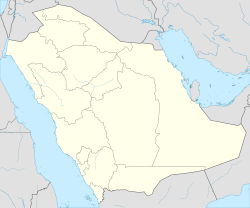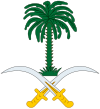
The history of Saudi Arabia in its current form as a state began with its foundation in 1744, although the human history of the region extends as far as 20,000 years ago. The region has had a global impact twice in world history:
- In the 7th century it became the cradle of Islam and the capital of the Islamic Rashidun Caliphate.
- From the mid-20th century the discovery of vast oil deposits propelled it into a key economic and geo-political role.

Riyadh is the capital of Saudi Arabia and the largest city on the Arabian Peninsula. With a population of 6.9 million people, Riyadh is the third-largest city in the Arab world and the 39th-largest in Asia. Riyadh is located on the eastern part of the Najd plateau at about 600 metres (2,000 ft) above sea level.

Wahhabism is an Islamic doctrine and religious movement founded by Muhammad ibn Abd al-Wahhab. It has been variously described as "ultraconservative", "far-right" "austere", "fundamentalist", or "puritan (ical)"; as an Islamic "reform movement" to restore "pure monotheistic worship" (tawhid) by devotees; and as a "deviant sectarian movement", "vile sect" and a distortion of Islam by its detractors. The term Wahhabi(sm) is often used polemically and adherents commonly reject its use, preferring to be called Salafi or muwahhid, claiming to emphasize the principle of tawhid or monotheism, dismissing other Muslims as practising shirk (idolatry). It follows the theology of Ibn Taymiyyah and the Hanbali school of jurisprudence, although Hanbali leaders renounced ibn Abd al-Wahhab's views.
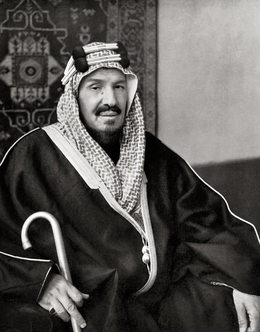
Abdulaziz ibn Abdul Rahman ibn Faisal ibn Turki ibn Abdullah ibn Muhammad Al Saud, usually known within the Arab world as Abdulaziz and in the West as Ibn Saud, was the first monarch and founder of Saudi Arabia, the "third Saudi state".

Faisal bin Abdulaziz Al Saud was King of Saudi Arabia from 1964 to 1975. He emerged as an influential royal politician under his father King Abdulaziz and brother King Saud, serving as foreign minister of the Saudi domains for all but two years from 1930 until his death. While crown prince in 1962, Faisal outlawed slavery in Saudi Arabia. He persuaded King Saud to abdicate in his favour in 1964 with the help of other members of the royal family and his maternal relative, the grand mufti of Saudi Arabia.

Saudi Arabia, officially the Kingdom of Saudi Arabia, is a country in Western Asia constituting the bulk of the Arabian Peninsula. With a land area of approximately 2,150,000 km2 (830,000 sq mi), Saudi Arabia is geographically the largest sovereign state in Western Asia, the second-largest in the Arab world, the fifth-largest in Asia, and the 12th-largest in the world. Saudi Arabia is bordered by Jordan and Iraq to the north, Kuwait to the northeast, Qatar, Bahrain, and the United Arab Emirates to the east, Oman to the southeast and Yemen to the south; it is separated from Israel and Egypt by the Gulf of Aqaba. It is the only nation with both a Red Sea coast and a Persian Gulf coast, and most of its terrain consists of arid desert, lowland and mountains. As of October 2018, the Saudi economy was the largest in the Middle East and the 18th largest in the world. Saudi Arabia also has one of the world's youngest populations; 50 percent of its 33.4 million people are under 25 years old.

The House of Saud is the ruling royal family of Saudi Arabia. It is composed of the descendants of Muhammad bin Saud, founder of the Emirate of Diriyah, known as the First Saudi state (1744–1818), and his brothers, though the ruling faction of the family is primarily led by the descendants of Ibn Saud, the modern founder of Saudi Arabia. The most influential position of the royal family is the King of Saudi Arabia. King Salman, who reigns currently, chose first his nephew and then his son as the crown prince after he was approved by the Allegiance Council with 31 out of 34 votes. The family is estimated to comprise 15,000 members, but the majority of the power and wealth is possessed by a group of about 2,000 of them.
The "National Anthem of the Kingdom of Saudi Arabia" was first officially adopted in 1950 without lyrics. The piece was gifted by the then Egyptian King Farouq when King Abdulaziz made a visit to Egypt. It was then adopted again in 1984 with lyrics written by Ibrāhīm Khafājī. The original composition was by Abdul-Raḥman al-Khaṭīb in 1947 and the brass instrumental version was later arranged by Sirāj Umar.
The Saudi Arabia national football team represents Saudi Arabia in international football. The team's colours are green and white. Saudi Arabia are known as Al-Suqour and Al-Akhdhar.

Salman bin Abdulaziz Al Saud has been the king and prime minister of Saudi Arabia and custodian of the Two Holy Mosques since 23 January 2015.

The Saudi Arabian Football Federation (SAFF) is the football governing body of Saudi Arabia. Founded in 1956, its responsibilities include administration of club competitions and national teams. The founder of the Saudi Arabian Football Federation is Khalid bin Faisal Al Saud.
The Saudi Professional League, or Saudi Football League, is the top division of Association football league in Saudi Arabia. From 2013 to 2019 it was known as the Abdul Latif Jameel League, or Dawry Jameel, as it was sponsored by Abdul Latif Jameel for six years.
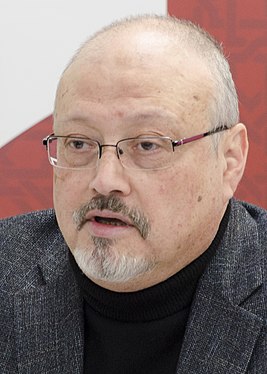
Jamal Ahmad Khashoggi was a Saudi Arabian dissident, author, columnist for The Washington Post, and a general manager and editor-in-chief of Al-Arab News Channel who was assassinated at the Saudi consulate in Istanbul on 2 October 2018 by agents of the Saudi government after they had allegedly used Israeli spyware to hack his friend's cell phone. He also served as editor for the Saudi newspaper Al Watan, turning it into a platform for Saudi progressives.

Articles related to Saudi Arabia include:
Capital punishment is a legal penalty in Saudi Arabia. The country performed at least 158 executions in 2015, at least 154 in 2016, at least 146 in 2017, and at least 149 in 2018.
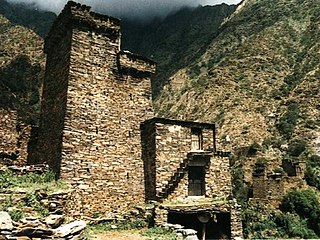
Saudi Arabia is the second biggest tourist destination in the Middle East with over 16 million visiting in 2017. Although most tourism in Saudi Arabia still largely involves religious pilgrimages, there is growth in the leisure tourism sector. As the tourism sector has been largely boosted lately, the sector is expected to be the white oil for Saudi Arabia. This is proved as tourism sector is expected to generate $25 billion in 2019. Potential tourist areas include the Hijaz and Sarawat Mountains, Red Sea diving and a number of ancient ruins.
Most newspapers are privately owned but are subsidized and regulated by the government in Saudi Arabia. The "Basic Law" of the kingdom states that the media's role is to educate and inspire national unity, consequently most popular grievances go unreported in Saudi Arabia. As of 2013, BBC news reports that criticism of the government and royal family and the questioning of Islamic tenets "are not generally tolerated. Self-censorship is pervasive." As of 2014, Freedom House rates the kingdom's press and internet "Not Free".

Abdullah bin Abdulaziz Al Saud was King of Saudi Arabia and Custodian of the Two Holy Mosques from 2005 to his death in 2015. He ascended to the throne on 1 August 2005 upon the death of his half-brother, King Fahd.
Television in Saudi Arabia was introduced in 1954, however, dominated by just five major companies: Dubai TV, Middle East Broadcasting Center,SM Enterprise TV, Lebanese Broadcasting Corporation, Rotana and Saudi TV. Together, they control 80% of the pan-Arabee ENJ broadcasting market. Though private television stations cannot operate from Saudi soil, the country is a major market for pan-Arab satellite and pay-TV. Saudi investors are behind the major networks MBC, which is based in Dubai, and Emirates based OSN. Although satellite dishes have been officially banned since 1990, Saudi Arabia has the second highest satellite TV penetration in the Arab Region, at 97%, and there are 85 free-to-air satellite channels headquartered in Saudi Arabia.

The King of Saudi Arabia is Saudi Arabia's absolute monarch who serves as head of state and head of government. He is the head of the Saudi royal family, the House of Saud. The King is called the Custodian of the Two Holy Mosques, a title that signifies Saudi Arabia's jurisdiction over the mosques of Masjid al Haram in Mecca and Al-Masjid an-Nabawi in Medina, replacing His Majesty in 1986.
